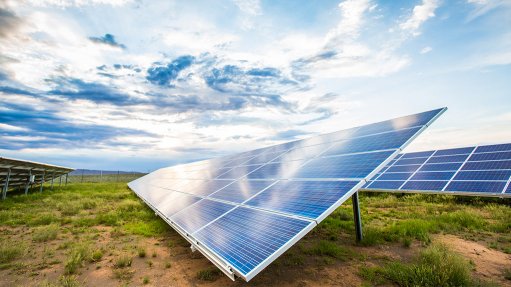
The Department of Science and Technology (DST) has welcome the launch of the country’s newest solar power plant, saying the R1.5-billion facility, near Kimberly, would contribute “immensely” to meeting the country's rising energy demands.
The Droogfontein solar power photovoltaic (PV) plant, constructed by emerging power company Globeleq in collaboration with other industry players and the Department of Environmental Affairs (DEA), is one of the first large solar farms in South Africa to be built by an independent power producer, arising from government's Renewable Energy Independent Power Producer Procurement Programme.
The plant was built on a 100 ha site and included more than 165 000 solar PV panels.
Droogfontein would supply the Eskom 132 kV gridline and generate 85 458 MWh a year – enough electricity to supply around 19 000 average homes.
Delivering the keynote address at the plant's inauguration on Thursday, Science and Technology Deputy Minister Michael Masutha said the DST supported the transition to a low-carbon economy, using cleaner energy solutions in line with the government's vision to reduce carbon emissions and move towards a sustainable energy system.
“Renewable energy holds the promise to improve energy security and access, and solve other socioeconomic challenges that South Africa is facing," he commented.
“The department is focusing on setting up the necessary systems to support the sustainable solar energy industry. This is done through supporting research, development and innovation in the energy sector, informing and influencing energy policy decisions, and supporting human capital development.”
To this end, the DST had established and was funding research initiatives at various institutions, such as the Renewable Energy Hub and Spokes Programme, hosted at Stellenbosch University, the University of Pretoria, Fort Hare University, the University of KwaZulu-Natal and the Nelson Mandela Metropolitan University.
The department also supported the solar energy resource mapping initiative, implemented through the South African Weather Service, and was also finalising the solar energy technology roadmap in collaboration with the DEA and the International Energy Agency.
“It is foreseen that the DST’s funding and support to renewable-energy research and technology development, as well as to human capacity development, will ultimately also benefit initiatives such as the Droogfontein plant, providing technical expertise and competence to address the needs of such plants, as well as arriving at new solutions, products and processes to address future solar photovoltaic plants,” said Masutha.